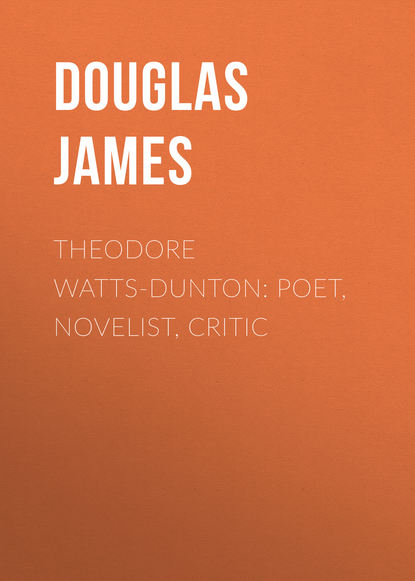По всем вопросам обращайтесь на: info@litportal.ru
(©) 2003-2024.
✖
Theodore Watts-Dunton: Poet, Novelist, Critic
Настройки чтения
Размер шрифта
Высота строк
Поля
Dr. Robertson Nicoll, discussing the latest edition of ‘Aylwin’ – the ‘Arvon’ illustrated edition – says: —
“When ‘Aylwin’ was in type, the author, getting alarmed at its great length, somewhat mercilessly slashed into it to shorten it, and the more didactic parts of the book went first. Now Mr. Watts-Dunton has restored one or two of these excised passages, notably one in which he summarizes his well-known views of the ‘great Renascence of Wonder, which set in in Europe at the close of the eighteenth century and the beginning of the nineteenth.’ In one of these passages he has anticipated and bettered Mr. Balfour’s speculations at the recent meeting of the British Association.”
Something like the same remark was made in the ‘Athenæum’ of September 3, 1904: —
“The writer has restored certain didactic passages of the story which were eliminated before the publication of the book, owing to its great length. Though the teaching of the book is complete without the restorations, it seems a pity that they were ever struck out, because they appear to have anticipated the striking remarks of Mr. Balfour at the British Association the other day, to say nothing of the utterances of certain scientific writers who have been discussing the transcendental side of Nature.”
The restorations to which Dr. Nicoll and ‘The Athenæum’ refer are excerpts from ‘The Veiled Queen,’ by Aylwin’s father. The first of these comes in at the conclusion of the chapter called ‘The Revolving Cage of Circumstance’ and runs thus: —
“‘The one important fact of the twentieth century will be the growth and development of that great Renascence of Wonder which set in in Europe at the close of the eighteenth century and the beginning of the nineteenth.
The warring of the two impulses governing man – the impulse of wonder and the impulse of acceptance – will occupy all the energies of the next century.
The old impulse of wonder which came to the human race in its infancy has to come back – has to triumph – before the morning of the final emancipation of man can dawn.
But the wonder will be exercised in very different fields from those in which it was exercised in the past. The materialism, which at this moment seems to most thinkers inseparable from the idea of evolution, will go. Against their own intentions certain scientists are showing that the spiritual force called life is the maker and not the creature of organism – is a something outside the material world, a something which uses the material world as a means of phenomenal expression.
The materialist, with his primitive and confiding belief in the testimony of the senses, is beginning to be left out in the cold, when men like Sir W. R. Groves turn round on him and tell him that “the principle of all certitude” is not and cannot be the testimony of his own senses; that these senses, indeed, are no absolute tests of phenomena at all; that probably man is surrounded by beings he can neither see, feel, hear, nor smell; and that, notwithstanding the excellence of his own eyes, ears, and nose, the universe the materialist is mapping out so deftly is, and must be, monophysical, lightless, colourless, soundless – a phantasmagoric show – a deceptive series of undulations, which become colour, or sound, or what not, according to the organism upon which they fall.’
These words were followed by a sequence of mystical sonnets about ‘the Omnipotence of Love,’ which showed, beyond doubt, that if my father was not a scientific thinker, he was, at least, a very original poet.”
The second restored excerpt from ‘The Veiled Queen’ comes in at the end of the chapter called ‘The Magic of Snowdon,’ and runs thus: —
“I think, indeed, that I had passed into that sufistic ecstasy expressed by a writer often quoted by my father, an Oriental writer, Ferridoddin: —
With love I burn: the centre is within me;
While in a circle everywhere around me
Its Wonder lies —
that exalted mood, I mean, described in the great chapter on the Renascence of Wonder which forms the very core and heart-thought of the strange book so strangely destined to govern the entire drama of my life, ‘The Veiled Queen.’
The very words of the opening of that chapter came to me:
‘The omnipotence of love – its power of knitting together the entire universe – is, of course, best understood by the Oriental mind. Just after the loss of my dear wife I wrote the following poem called “The Bedouin Child,” dealing with the strange feeling among the Bedouins about girl children, and I translated it into Arabic. Among these Bedouins a father in enumerating his children never counts his daughters, because a daughter is considered a disgrace.
Ilyàs the prophet, lingering ’neath the moon,
Heard from a tent a child’s heart-withering wail,
Mixt with the message of the nightingale,
And, entering, found, sunk in mysterious swoon,
A little maiden dreaming there alone.
She babbled of her father sitting pale
’Neath wings of Death – ’mid sights of sorrow and bale,
And pleaded for his life in piteous tone.
“Poor child, plead on,” the succouring prophet saith,
While she, with eager lips, like one who tries
To kiss a dream, stretches her arms and cries
To Heaven for help – “Plead on; such pure love-breath,
Reaching the throne, might stay the wings of Death
That, in the Desert, fan thy father’s eyes.”
The drouth-slain camels lie on every hand;
Seven sons await the morning vultures’ claws;
’Mid empty water-skins and camel maws
The father sits, the last of all the band.
He mutters, drowsing o’er the moonlit sand,
“Sleep fans my brow; sleep makes us all pashas;
Or, if the wings are Death’s, why Azraeel draws
A childless father from an empty land.”
“Nay,” saith a Voice, “the wind of Azraeel’s wings
A child’s sweet breath has stilled: so God decrees:”
A camel’s bell comes tinkling on the breeze,
Filling the Bedouin’s brain with bubble of springs
And scent of flowers and shadow of wavering trees,
Where, from a tent, a little maiden sings.
‘Between this reading of Nature, which makes her but “the superficial film” of the immensity of God, and that which finds a mystic heart of love and beauty beating within the bosom of Nature herself, I know no real difference. Sufism, in some form or another, could not possibly be confined to Asia. The Greeks, though strangers to the mystic element of that Beauty-worship which in Asia became afterwards Sufism, could not have exhibited a passion for concrete beauty such as theirs without feeling that, deeper than Tartarus, stronger than Destiny and Death, the great heart of Nature is beating to the tune of universal love and beauty.’”
With regard to the two sonnets quoted above, a great poet has said that the method of depicting the power of love in them is sublime. ‘The Slave girl’s Progress to Paradise,’ however, is equally powerful and equally original. The feeling in the ‘Bedouin Child’ and in ‘The Slave Girl’s Progress to Paradise’ is exactly like that which inspires ‘The Coming of Love.’ When Percy sees Rhona’s message in the sunrise he exclaims: —
But now – not all the starry Virtues seven
Seem strong as she, nor Time, nor Death, nor Night.
And morning says, ‘Love hath such godlike might
That if the sun, the moon, and all the stars,
Nay, all the spheral spirits who guide their cars,
Were quelled by doom, Love’s high-creative leaven
Could light new worlds.’ If, then, this Lord of Fate,
When death calls in the stars, can re-create,
Is it a madman’s dream that Love can show
Rhona, my Rhona, in yon ruby glow,
And build again my heaven?
The same mystical faith in the power of love is passionately affirmed in the words of ‘The Spirit of the Sunrise,’ addressed to the bereaved poet: —
Though Love be mocked by Death’s obscene derision,
Love still is Nature’s truth and Death her lie;
Yet hard it is to see the dear flesh die,
To taste the fell destroyer’s crowning spite
That blasts the soul with life’s most cruel sight,
Corruption’s hand at work in Life’s transition:
This sight was spared thee: thou shalt still retain
Her body’s image pictured in thy brain;
The flowers above her weave the only shroud
Thine eye shall see: no stain of Death shall cloud
Rhona! Behold the vision!
Some may call this too mystical – some may dislike it on other accounts – but few will dream of questioning its absolute originality.





